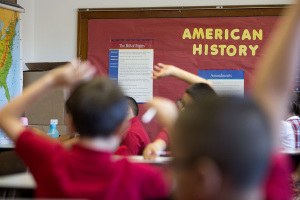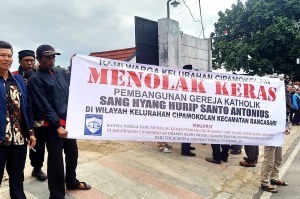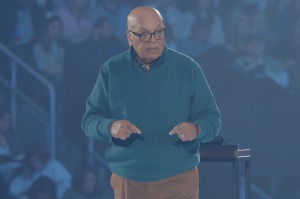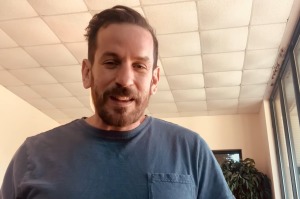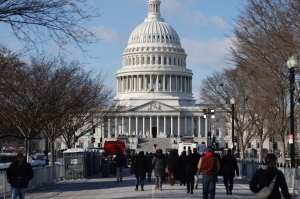Religious freedom advocates say State Dept. pushing a 'political narrative' on Nigerian violence
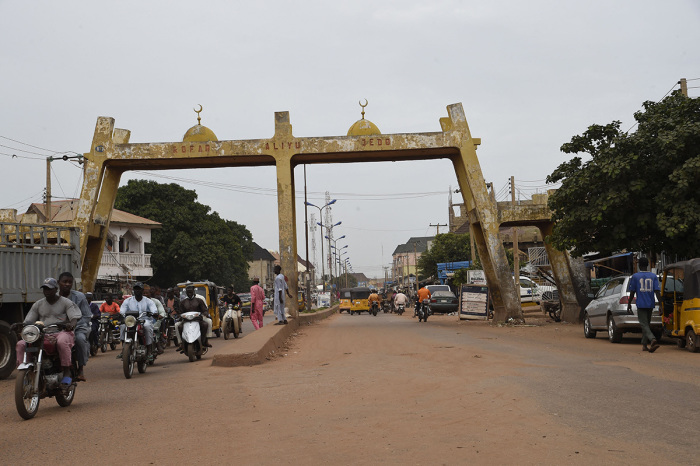
The U.S. State Department says it has raised concerns about religious freedom conditions in Nigeria even though advocates accuse the Biden administration of pushing a "political narrative" as the West African country faces increasing extremist and communal violence.
The State Department released its annual international religious freedom report Thursday, which Secretary of State Antony Blinken described as a "thorough, fact-based review of the state of religious freedom in nearly 200 countries and territories around the world."
The report featured a 25-page section on the state of religious freedom in Nigeria, which was previously included on the State Department's "Countries of Particular Concern" list of governments that engage in or tolerate egregious violations of religious freedom.
Blinken removed Nigeria from the list last November, just under a year after then-Secretary of State Mike Pompeo added the West African nation to the list in December 2020. According to advocates, Nigeria was the first secular democracy to be added to the CPC list, which carries the possibility of sanctions.
The new State Department report cited testimony from "civil society organizations and media," who "stated that insecurity was pervasive throughout the country and increased nationwide, particularly in the North West region." As noted in the report, "Islam is the dominant religion in the North West region."
"There was pervasive violence involving predominantly Muslim herders and mostly Christian, but also Muslim, farmers, particularly in the North Central, but also in the North West (where most farmers were Muslim) and South West regions," the report added. "According to the Nigeria security tracker maintained by the Council on Foreign Relations, there were an estimated 10,399 deaths from violent conflict during the year, compared with 9,694 in 2020."
The Council on Foreign Relations estimated that 1,112 deaths "resulted from violence among ethnic groups, herdsmen, and farmers, some of which had implications for religion and religious freedom, according to multiple observers or, in the words of the council, 'sometimes acquires religious overtones.'"
In the heavily Christian southwest portion of Nigeria, local media and officials determined that criminal attacks initially attributed to members of the predominantly Muslim Fulani ethnic group were instead perpetrated by "armed criminal groups of various ethnicities."
Previous Christian Post articles on the killings of Christians were cited in the report, including a June 2 article about the death of a Nigerian Christian pastor and his 3-year-old son at the hands of Fulani radicals and a May 24 article about the arson of a church building by "bandits" who also shot eight Christians to death.
Last November, the same month that the State Department announced Nigeria's removal from the CPC list, Blinken met with high-ranking government officials in Nigeria.
According to the report, Blinken "raised religious freedom issues with government officials in a visit in November, as did embassy and consulate general officials throughout the year."
"Issues included the resolution of widely publicized blasphemy cases and the role of religious leaders in peacebuilding and social trust, and societal abuses affecting religion," the report reads.
Among other officials, Blinken and U.S. diplomats met with President Muhammadu Buhari and Vice President Yemi Osinbajo.
"U.S. officials also addressed religious tensions and efforts to bring religious groups together with several state governors – including the governors of Kaduna, Kano, Benue, Nasarawa, Taraba, Borno, Plateau, Akwa Ibom, Enugu, and Abia States – and other government officials throughout the country," the report reads. "They discussed government and government-supported grassroots efforts to reduce violence, combat insecurity, and promote religious freedom and interreligious tolerance."
Stephen Enada, president and founder of the International Committee on Nigeria, told The Christian Post in an email that "Blinken has not provided the needed leadership that can stabilize Nigeria's religious fault lines by removing Nigeria from the CPC designation."
Enada, a Nigerian Christian who fled to the U.S. several years ago after his cousin was killed, warned that violence occurring across multiple regions in the country, including the rise of terrorist groups like Boko Haram and the Islamic State West Africa Province in the northeast, is impacting millions.
He said, "religiously motivated killings are ongoing and millions of people are displaced, and teenage girls are sold as sex slaves by the religious extremists."
"The issue of terrorism and other militant activities that have engulfed Nigeria in the past 10 years is as a result of state failure and lack of accountability," he argues.
While Enada suggests that the Nigerian government could do more to protect religious freedom, he praised the Nigerian Constitution for "the absence of a state religion" and it's granting of the right to practice a chosen "religion or faith without any force or coercion."
Nina Shea, the director of the Hudson Institute's Center for Religious Freedom, told CP in an email that "the State Department has missed the big picture of vulnerable Christian minorities of northern Nigeria being repeatedly attacked and driven from their villages by Muslim extremists and their agents who act with complete impunity."
"Authorities fail to investigate and prosecute the perpetrators of these large-scale atrocities, and moreover prosecute and threaten local journalists who report on them," she stated.
"There's an incomprehensible gap between the State Department's reporting and what desperate Christians on the ground are reporting to religious freedom advocates here. This gap reflects State's overreliance on sources that it and [United States Agency for International Development] funds, which in turn push a political narrative favored by State. That narrative says that northern violence is driven by a conflict over a scarcity of resources as a result of climate change."
Sam Brownback, who served as ambassador-at-large for international religious freedom in the Trump administration and is the former governor of Kansas, was one of the first religious freedom advocates who condemned Nigeria's removal from the CPC list last fall.
"The sudden removal of Nigeria from the CPC list is a serious blow to religious freedom in both Nigeria and across the region," he said. "Just when we should be doing everything possible to stop the relentless violence that's targeting Christians and others, we do the opposite."
"This rewards the Nigerian government for tolerating severe religious freedom violations and sends a message to extremists that their actions will continue to go unpunished," he added. "People of faith in Nigeria will bear the fallout of this decision, and that's unacceptable."
The U.S. Commission on International Religious Freedom, a bipartisan panel tasked with advising the State Department and Congress about religious freedom matters, was critical of Nigeria's removal from the CPC list.
"USCIRF is especially displeased with the removal of Nigeria from its CPC designation, where it was rightfully placed [in 2020]," USCIRF Chair Nadine Maenza said at the time.
The State Department's report offered praise to the Nigerian government for its response to the religious violence in the country.
"President Buhari and Vice President Osinbajo regularly condemned attacks on places of worship and those attempting to exploit religious differences," the report reads. "Buhari regularly consulted with key Muslim and Christian leaders and celebrated both official Christian and Muslim holidays."
The report pointed to a Feb. 15 statement from Buhari asking religious leaders and government officials to "join hands with the Federal Government to ensure that communities in their domain are not splintered along ethnic and other primordial lines" as evidence of the government's support for religious freedom. Additionally, Buhari vowed that his "government will protect all … religious groups, whether majority or minority, in line with its responsibility under the constitution."
The report also commented on Nigeria's removal from the CPC list, saying that Blinken "determined that Nigeria did not meet the criteria" to remain on the list or be even added to the State Department's second-tier "Special Watch List."
Open Doors USA, an organization that monitors persecution in over 60 countries, ranks Nigeria as the seventh worst country in the world when it comes to Christian persecution. The religious freedom advocacy group Release International included Nigeria on a list of countries where Christian persecution was expected to worsen in 2022.
Ryan Foley is a reporter for The Christian Post. He can be reached at: ryan.foley@christianpost.com

















